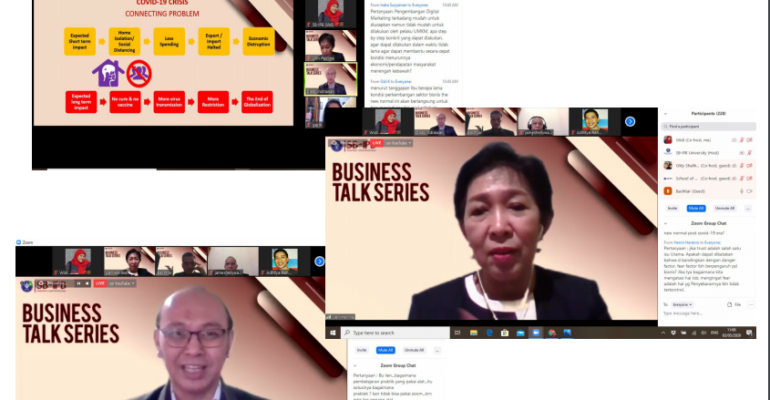SB-IPB BUSINESS TALK SERIES #1: “Covid-19: Implication for Business in Indonesia & Occupational Disease and The Rise of Digital Marketing Roles”

SB-IPB BUSINESS TALK SERIES #1: “Covid-19: Implication for Business in Indonesia & Occupational Disease and The Rise of Digital Marketing Roles”
SB IPB, BOGOR – The inaugural Business Talk Series (BTS) was successfully carried out online on Sunday , 3 May 2020 with 230 participants, dominated by general participants. The topics discussed at the seminar as well as a discussion forum this time were related to COVID-19, namely “Occupational Diseases and The Rise of Digital Marketing Roles” and “Implication for Business in Indonesia” by inviting two speakers who were lecturers of the IPB University Business School, namely, Ir. Lien Herlina, MSc and Dr. Raden Dikky Indrawan, SP, MM.
The webinar started at 10.05 WIB guided by Muchamad Bachtiar, STP, MM as the moderator. The SB IPB lecturer who is also a graduate of IPB organized the event until the discussion session ended. Dean of SB IPB, Prof. Dr. Ir. Noer Azam Achsani, MS opened the event with a short speech accompanied by a brief introduction to SB IPB, followed by Ms. Lien Herlina as the first speaker. He said that COVID 19 has exposed many work activities and has also caused many hidden victims. Furthermore, he explained that COVID-19 was not explicitly included as the infectious virus according to ILO proceedings so that there was no clear protection scheme for workers who had a high risk of being exposed to COVID-19. Therefore, it is important for every country to assess COVID-19 as occupational diseases, which kill more workers than work accidents with a ratio of 7: 1.
The New Normal is said to be a new condition after COVID-19 which is dominated by two things, namely the health protocol and all activities carried out from home or the current trend is called work from home (WFH). This is proof that the Internet of Things (IoT) is increasingly reliable, which can be seen from the big role of e-commerce and digital marketing. He also conveyed that COVID-19 from an entrepreneurial perspective has hit almost all the veins of Indonesia’s business structure, the majority of which are based on people mobility and the people crowd so that economic growth is predicted to slow down in 2020-2021. Therefore, every business needs a mental readiness to bounce back with several strategic options, namely compounding with The New Normal with the novelty and courage to think beyond, or giving up the business because it is unable to adapt.
A further explanation was given by Mr. Dikky Indrawan. It is said that the basis for disruption at this time is a matter of concern for everyone, namely the health issue which has become The New Game Changer. This is due to the rapid development of information that has made the uncertainty of COVID-19 the highest for the past 15 years. COVID-19 is also considered to be the most impactful crisis because it causes connecting problems. It was also emphasized that current social distancing does not eliminate the virus, but businesses must continue to run even though a vaccine has not been found. Not to mention other causes of uncertainty that may arise, such as second waves and disease seasonality, which businesses must also respond to quickly. There are several scenarios in The New Normal condition that require every business to take maneuvers because the worst-case scenario can occur which has an impact on de-globalization. He also conveyed that the restriction impact on the business sector varies, from the lowest to the highest, along with various business clusters and how businesses can respond to this condition. The first thing to respond to is cash flow, which includes input, operation and output. In output management, business actors must be able to maintain consumer confidence so that they must make changes to products. This has an impact on operation management which will experience changes in the aspects of human resources, IT and systems, operations, production design, and communication. In the end, this will lead to changes in input management.
The conclusion is uncertainty must be defeated with the principle that every business is a healthy business, must be able to solve problems and think about the future. In addition, business adjustments must be made to maintain consumers and financial conditions. The most important thing is responsible leadership that can understand and care about business resilience. (Faa)

